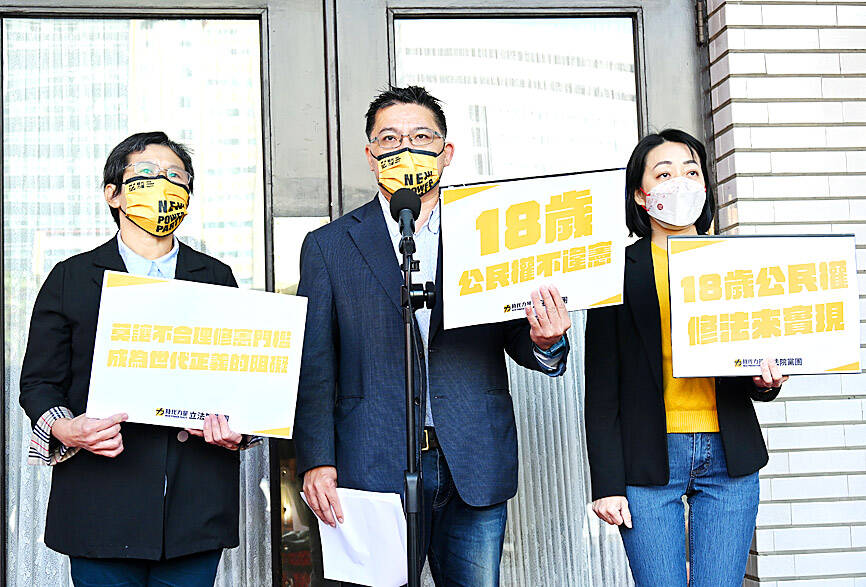New Power Party (NPP) lawmakers yesterday introduced a bill to lower the voting age to 18 after a referendum to ratify the measure as a constitutional amendment failed to pass on Nov. 26.
The bill to amend Article 14 of the Civil Servants Election And Recall Act (公職人員選舉罷免法) is being scheduled for deliberation by the Legislative Yuan’s Internal Administration Committee, the NPP legislative caucus told a news conference at the legislature in Taipei.
Additionally, the bill would restore the voting rights of people who are under a declaration of guardianship, as limits to franchisement contravene the UN Convention on the Rights of Persons with Disabilities, it said.

Photo: Fang Pin-chao, Taipei Times
The proposed amendments do not conflict with Article 13 of the Constitution, which stipulates that people must be given the right to vote at age 20, NPP Legislator Chiu Hsien-chih (邱顯智) said.
The legislative intent of Article 13 is to enshrine the rights of people who are 20 or older, not prevent the voting age from being lowered, Chiu said.
The purpose of the Constitution is to limit the power of the government while expanding civil rights, including suffrage, he said.
The Constitution explicitly states that the nation is a democratic republic, he said.
The party understands that proposing changes to the voting age so soon after the referendum defeat could trigger controversy, but the issue is important, NPP Legislator Claire Wang (王婉諭) said.
The referendum results showed that there was a clear majority who supported lowering the voting age to 18, Wang said, adding that the high threshold to change the Constitution is not a reason to abandon generational justice.
The bill’s constitutionality is for the Constitutional Court to decide and it would not have a chance to do so unless the amendment is promulgated, she said.
The NPP hopes that the Democratic Progressive Party and the Chinese Nationalist Party (KMT) continue to support lowering the voting age, she added.

Prosecutors in New Taipei City yesterday indicted 31 individuals affiliated with the Chinese Nationalist Party (KMT) for allegedly forging thousands of signatures in recall campaigns targeting three Democratic Progressive Party (DPP) lawmakers. The indictments stem from investigations launched earlier this year after DPP lawmakers Su Chiao-hui (蘇巧慧) and Lee Kuen-cheng (李坤城) filed criminal complaints accusing campaign organizers of submitting false signatures in recall petitions against them. According to the New Taipei District Prosecutors Office, a total of 2,566 forged recall proposal forms in the initial proposer petition were found during the probe. Among those

ECHOVIRUS 11: The rate of enterovirus infections in northern Taiwan increased last week, with a four-year-old girl developing acute flaccid paralysis, the CDC said Two imported cases of chikungunya fever were reported last week, raising the total this year to 13 cases — the most for the same period in 18 years, the Centers for Disease Control (CDC) said yesterday. The two cases were a Taiwanese and a foreign national who both arrived from Indonesia, CDC Epidemic Intelligence Center Deputy Director Lee Chia-lin (李佳琳) said. The 13 cases reported this year are the most for the same period since chikungunya was added to the list of notifiable communicable diseases in October 2007, she said, adding that all the cases this year were imported, including 11 from

China might accelerate its strategic actions toward Taiwan, the South China Sea and across the first island chain, after the US officially entered a military conflict with Iran, as Beijing would perceive Washington as incapable of fighting a two-front war, a military expert said yesterday. The US’ ongoing conflict with Iran is not merely an act of retaliation or a “delaying tactic,” but a strategic military campaign aimed at dismantling Tehran’s nuclear capabilities and reshaping the regional order in the Middle East, said National Defense University distinguished adjunct lecturer Holmes Liao (廖宏祥), former McDonnell Douglas Aerospace representative in Taiwan. If

The Mainland Affairs Council (MAC) today condemned the Chinese Communist Party (CCP) after the Czech officials confirmed that Chinese agents had surveilled Vice President Hsiao Bi-khim (蕭美琴) during her visit to Prague in March last year. Czech Military Intelligence director Petr Bartovsky yesterday said that Chinese operatives had attempted to create the conditions to carry out a demonstrative incident involving Hsiao, going as far as to plan a collision with her car. Hsiao was vice president-elect at the time. The MAC said that it has requested an explanation and demanded a public apology from Beijing. The CCP has repeatedly ignored the desires